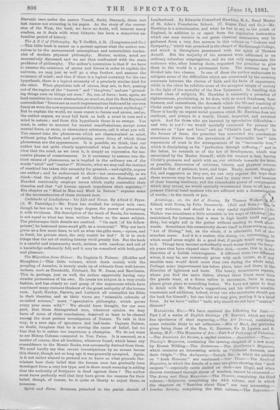Spirit and Form. Sermons, preached in the parish church of
Leatherhead. By Edwards Comerford Hawkins, M.A., Head Master of St. John's Foundation School. (C. Kegan Paul and Co.)—Mr. Hawkins is a schoolmaster, and what he has to say to the youth of England, in addition to or apart from the regulation instruction which our sons receive in our great classical seminaries, may be gathered from a very fine sermon in this volume on " Culture and Sympathy," which was preached in the chapel of Marlborough College, and which is throughout penetrated with the spirit of Thomas Arnold. But the majority of the sermons were addressed to an ordinary suburban congregation, and we can only congratulate the audience who, after hearing them, requested the preacher to give them to the world in a permanent form. The sermons may be divided into two classes. In one of these the author endeavours to mitigate some of the difficulties which are occasioned by the seeming contrasts between the claims of faith and the facts of experience, while in the other he exhibits some of the accepted usages of society in the light of the morality of the New Testament. In handling this second class of subjects, Mr. Hawkins is eminently a preacher of righteousness, proclaiming, as he does, with so much frankness, fear- lessness, and earnestness, the demands which the life and teaching of Christ make upon the entire sphere of human thought and activity. There is hardly an urgent social question which Mr. Hawkins does not confront, and always in a manly, liberal, impartial, and reverent spirit. And for those who are haunted by speculative difficulties— and who is not P—we would specially commend for perusal the sermons on "Law and Love," and on "Christ's Last Words." In the former of these, the preacher has converted the conclusions sometimes drawn from the prevalence of "inexorable law" into arguments of trust in the arrangements of an "inexorable love," which is disciplining us for "perfection through suffering ;" and in the latter, he reminds us of the law of development, which was enunciated by the Master himself ; while his counsel is that, having Christ's presence and spirit with us, our attitude towards the later, or possible, discoveries of criticism, history, and physical science should be that of patience, trust, and hope. Manly, earnest, thought- ful, and suggestive as they are, we can only express the hope that these sermons may be known and read by many men ; and because of their bracing tendency, and the remarkable power of compression which they reveal, we would specially recommend them to all late or present Clerical head masters who are afflicted with a determination of words,—to the mouth or pen.
































 Previous page
Previous page